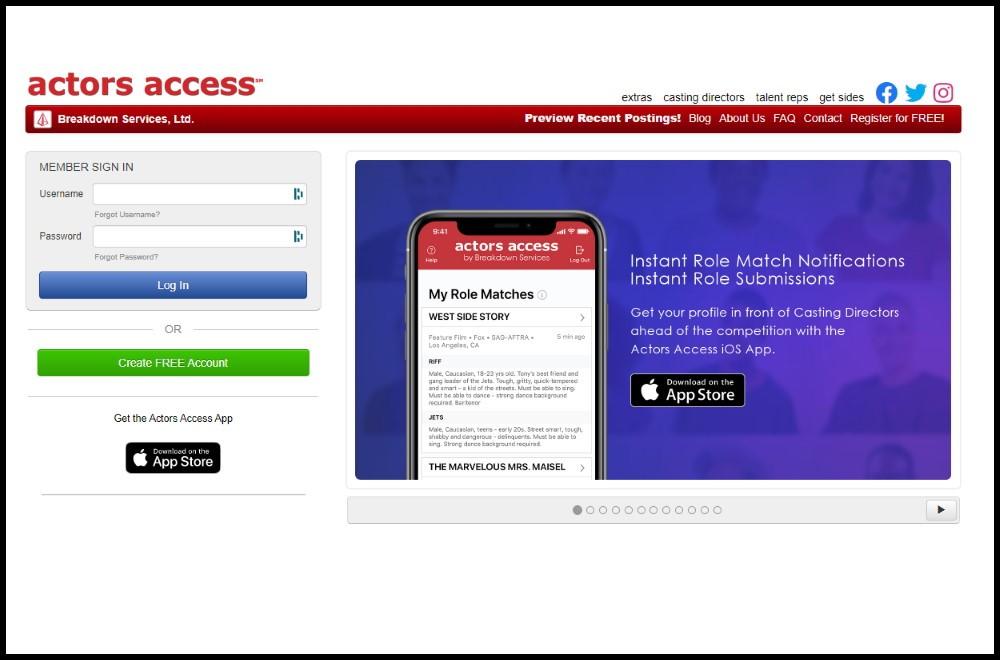How to Become an Actor in Film and Television
10 Steps to Start an Acting Career
by Kurt Yue, working actor and founder of The Acting Career Center
If you’re here, it means you’re thinking about embarking on the journey of becoming a professional actor in film and television. Exciting! As a working actor in the industry, I want to help point you in the right direction. The path certainly won’t be easy. In fact, you’ll find that an acting career is quite the rollercoaster ride, full of ups and downs, successes and setbacks. But what in life worth pursuing is ever easy? And like they say, if it were easy, everyone would do it. So, if you’re the type of person who believes in following a dream, beating the odds, and proving naysayers wrong, then keep reading. Below are ten steps every new actor should take to jumpstart their career.

Step 1 - Start Training Now
Get into an acting class. Training is the first step for every aspiring actor. Training will also be an ongoing process for the entirety of your career. I’m approaching 15 years in the industry and I still take classes to up my game, learn new skills, and keep my tools sharp.
If you are in high school, I recommend starting your training now by getting involved in school plays and drama club. You can also look for acting studios outside of school that offer classes for teens. If you are in college, consider taking some theatre classes if your school offers them. If you are out of school and perhaps currently working in another industry (like I was when I first started), look for some acting classes you can attend on your days off or after work. A quick Google search should turn up any acting studios in your city.
Do you need a theatre degree to start working on movies and television shows? The short answer is no. While obtaining a BFA or MFA in acting can certainly make you a disciplined, well rounded actor, the degree itself doesn’t carry the weight you might think it would in the film and television world. Agents and casting directors aren’t exactly fighting to see the actors with the most prestigious diplomas. They just want to see well trained actors, regardless of how they got there.
What classes should you take? There will be plenty of different classes available and all of them will help you in one way or another. If you are a complete beginner, a technique class will set the foundation for everything else to come. The majority of my training is in the Meisner technique. You may find that Meisner is a great fit for you as well, or you may find a different technique suits you better. Either way, find a solid technique class to get the ball rolling.
After that, you can choose from scene study, improv, on camera, voice and body, etc., and I will leave that decision up to you. The only class that is absolutely essential, in my opinion, is an on-camera audition class. You must learn how to audition and you must practice on camera. It’s how you’ll make your money in this industry! Get my free Audition Cheat Sheet Here.

Step 2 - Learn How the Business Works
If you haven’t heard anyone say this already, then let me be the first to tell you: being an actor is like running your own business. When it comes to building a successful career, your acting ability is only one piece of the puzzle (albeit, an important piece). Believe it or not, the vast majority of the work you will be doing on a day to day basis will be on the business side of things, not the acting side. Once you learn to manage your career like the CEO of a company, the industry will start making a lot more sense. Every casting decision is a business decision. Producers create movies and television shows to make money. Everything is driven by the business side of things.
So, where should you start? In my opinion, the number one resource on the business of acting is the book Self-Management for Actors by Bonnie Gillespie. I know that many college acting programs have this book as required reading, and for good reason. It is the most comprehensive guide on navigating the industry that I have ever read.
Okay, after reading that book, what else can you do? Well, in addition to your acting classes, consider taking a class on screenwriting, or directing, or producing, or any number of behind-the-camera jobs. The more you know about how the industry works, the more you will understand how you, as an actor, will fit into it.

Step 3 - Start Building Your Network
You’ve heard the saying ‘It’s not what you know, it’s who you know’? Well, I half-agree with that. I like to say ‘It’s both. It’s what you know AND who you know’. The ‘who’, is going to come from networking. Your entire career is going to be built on relationships. Your relationship with your team (agent/manager); your team’s relationship with casting; your relationship with casting; your relationship with other actors, with directors, with producers, with crew members, etc. Remember, the power of your network isn’t about who you know. It’s about who they know. One day, someone in your circle will hear about a role from someone else and think “I know who would be perfect for that!” and call you up. So start making connections now.
If you’ve started taking classes, then you’ve already started building your network! Your teachers and your peers are going to be some of your most valuable connections, especially when you are just starting. You can ask for their advice and recommendations on headshot photographers, agents, etc. And don’t forget that relationships are a two-way street. Don’t bring people into your network simply because you might have something to gain from them. Make sure you can offer something in return as well. If you hear about a role that a fellow actor would be perfect for, make that phone call!
I was once offered a role in a feature film I had never auditioned for because one of the producers worked with me on a previous project. Before that day, I thought things like that only happened to movie stars. But that’s the power of having a great network, you never know when a relationship will pay off down the road.

Step 4 - Get Professional Headshots
Every business needs a marketing plan and an actor’s most important marketing tool is their headshot. Your headshot is the first thing anyone in the industry sees of you, so it’s absolutely critical to make a good first impression.
What makes a good headshot? Many factors. But the most important thing is that it needs to look like you. Don’t over-do your makeup for the headshot session and don’t photoshop the images to the point that they look fake. The worst thing you can do is walk into a casting session and not look like the photo they were sent by your agent.
Also, PLEASE Go to a professional headshot photographer. Yes, it’s going to cost money and it’s probably going to cost more than you want to spend. But you gotta look at it as a business investment in your career. If you cut corners here and you get headshots that look amateur, agents and casting directors are NOT going to take you seriously.
Imagine if a lawyer gave you their business card and that business card was printed on regular flimsy printer paper and cut out with scissors. Are you going to take that lawyer seriously? That’s what it looks like if you’re an actor without a professional headshot. You want to be an actor? Well your headshot is going to be your most important marketing tool. Invest in it.

Step 5 - Create Your Casting Profiles
Ok, now that you have professional headshots, it’s time to set up your casting profiles. If you live in North America, the two most widely used casting websites today are Actors Access and Casting Networks. You can set up free accounts on both platforms. Your profiles on these websites will serve as an online resume for other industry professionals to see. You can also browse any public casting calls on each. Broadly speaking, Actors Access is used more in the film and television world and Casting Networks is used more in the commercial world. But you will see crossover, occasionally.
If you live outside of North America, you will have to find out what casting websites are used in your location. How easy it will be to find these websites will probably depend on the amount of film and tv production in your region. Start with your network. Ask your teachers and your peers for their advice.

Step 6 - Submit Yourself for Auditions
With some training under your belt, new headshots ready, and casting profiles set up, it’s time to start auditioning! Yes, you can start auditioning without an agent! Like I said before, casting websites like Actors Access and Casting Networks will have public casting calls that you can browse and self-submit for. Make sure you select the correct region when browsing; Don’t submit to jobs in Toronto if you live in Dallas.
There are pros and cons to working on student films and non-union indie projects. But in the beginning, the pros far outweigh the cons. Many of these projects will be unpaid or very low pay. But just like any other industry, sometimes you need to take the unpaid internship in order to show the world what you’re capable of. At this point in your career, you will be needing audition experience, on-set experience, and demo reel footage more than anything. And yes, audition for theatre as well. Even though your ultimate goal may be to work on camera, acting in plays can be invaluable training that will serve you for the rest of your career.
A note about submitting yourself on publicly posted casting calls: Don’t be discouraged if you don’t get selected to audition. You probably won’t be selected most of the time. Why? These projects are probably getting thousands of actor submissions and producers will only have the bandwidth to request a fraction of those people to audition. That’s why your headshot needs to stand out as a two-inch thumbnail!

Step 7 - Create a Demoreel
After acting in your first independent film, you will, hopefully, receive footage that you can use to start a demo reel. Don’t worry if you only have one short scene to use; everyone’s demo reel starts somewhere. If you’ve been fortunate enough to work on multiple projects, then you may have more scenes to add to the reel. Great! (If you’ve also done some commercial work, those scenes go on a separate reel.)
Rule of thumb is to keep your theatrical demo reel on the shorter side, about 90 seconds to two minutes max. Agents and casting directors aren’t going to be watching more than that anyway. In fact, they probably aren’t going to be watching more than the first 20 seconds so lead with your best stuff!
And don’t fall into the trap of thinking your best acting is necessarily your most emotional scenes. I’ve seen demo reels start off with nothing but crying. That only shows us that you can cry, it doesn’t show us you can act. Don’t underestimate the power of a scene with a simple conversation between you and another person. If you can listen and respond truthfully and make it look real, that can be a great scene for a reel.

Step 8 - Update Casting Profiles and IMDb
Armed with fresh new credits and your first demo reel, it’s time to update those casting profiles. Add any new credits to the online resumes and upload the demo reel to the respective media libraries.
This may also be a good time to create an IMDb Pro account. An IMDb Pro account will allow you to add photos and demo reels to your public profile, add contact and representation info, research other industry professionals (agents, casting directors, managers), and find projects in pre-production that you may want to target down the line.If you’re serious about a career in film and television, an IMDb Pro account is a must.

Step 9 - Submit to Your First Agent
At last, it’s time to submit to talent agencies and sign with your first agent. Many people will want to jump to this step right from the get-go because they think that all they need is the right agent to magically make them into a working actor. That’s not how it works. Agents don’t turn people into actors the same way hospitals don’t turn people into doctors. Hospitals hire people who are already doctors. And agents sign people who have already done steps one through eight above and have proven themselves to be ready for the industry.
If you are, indeed, ready, then an agent can open doors for you that you otherwise may not have been able to open yourself. Heck, you may not have even known those doors were there! The vast majority of auditions for major movies and television shows will be sent to agents and NOT posted on any public casting websites. So, oftentimes, the only way for an actor to access those auditions is to sign with an agent who has access to those auditions.
Once you do sign with your first agent (first of all, congrats!), don’t take it as an indication that you can take your foot off the gas. A fatal mistake many actors make is to sit back and wait for the phone to ring because they think their agent is now taking charge of their career. At the end of the day, YOU are still the biggest stakeholder in your career. You need to continue to train, continue to learn about the business, continue to build your network, continue to update your marketing materials (headshots, demo reels), and continue to submit yourself and audition for projects on the various casting websites. Remember, your agent only takes a 10% commission off of what you make. So you should still be doing 90% of the work.

Step 10 - Branch Out to a Bigger Market
You’ve got an agent! Great! You’re getting big auditions! Super! You are booking jobs and making money! Fantastic! Now what? Well, now it’s time to expand your business. Unless you already live in Los Angeles, you will most likely consider moving to a bigger production market at some point in your career.
This is a huge decision and should not be taken lightly or made on a whim. I’ve seen too many actors move to a new city without giving it much thought only to find out that they weren’t prepared for the mental/emotional/financial struggles they encountered. So, please, do as much research as you can and make a plan before you make the jump!
Where should you move? Well, that’s going to be a very personal decision. Nobody is going to be able to make that choice for you. I started my acting career in Cleveland, Ohio back in 2008. In 2016, I decided to move to Atlanta instead of Los Angeles or New York. The biggest determining factor for me was the cost of living.
Fast forward to today and I couldn’t be happier with my decision. Atlanta has offered me more opportunities than I could have dreamed of when I was in Cleveland. Could I still go to Los Angeles in the future? It’s definitely possible. But for now, I’m 100% focused on building my career in Atlanta.

Step 11 - Repeat
Once you move to a new market, it’s time to start the process all over again. Take classes in your new city, learn about the business in your new city, network in your new city, get new headshots, audition for local projects, get a new agent; the location is different but the process is the same.
Yes, the process is going to take time, probably much more time than you expect. But the more you learn to enjoy the process, the happier you will be. In life and in your career. This reminds me of one of my favorite expressions: It’s not about the pursuit of happiness, it’s about finding happiness in the pursuit.

Do NOT Audition Again Before Reading This Free Guide
Take your film and TV auditions to the next level. Learn how to apply the audition strategies of a working professional actor.

